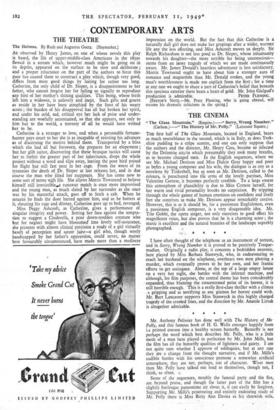CONTEMPORARY. ARTS
THE THEATRE
The Heiress. By Ruth and Augustus Goetz. (Haymarket.)
As observed by Henry James, on one of whose novels this play as based, the life of upper-middle-class Americans in the 185os fl. owed in a stream which, however much might be going on in its depths, appeared on the surface to be slow and deliberate ; and a proper reluctance on the part of the authors to force this pace has caused them to construct a play which, though very good, differs from most good things by lasting for rather too long. Catherine, the only child of Dr. Sloper, is a disappointment to her father, who cannot forgive her for failing so signally to reproduce any hint of her mother's shining qualities. This being, whose birth lett him a widower, is unlovely and inept. Such gifts and graces as reside in her have been atrophied by the frost of his weary acorn; the burden of his disapproval has all but broken her spirit, and under his oold, sad, critical eye her lack of poise and under- standing are woefully accentuated, so that she appears, not only to him but to the world, a travesty of all he would have wished her to be.
Catherine is a stranger to love, and when a personable fortune- hunter pays court to her she is as incapable of resisting his advances as of discerning the motive behind them. Transported by a bliss - which she had all but forsworn, she prepares for an elopement ; but her glib suitor, discovering that these brusque tactics will cause her to forfeit the greater part of her inheritance, drops the whole project without a word and slips away, leaving the poor bird poised for flight but still fast pent in her cage. From the worst of its tyrannies the' death of Dr. Sloper at last releases her, and in due -course the man who jilted her reappears. She has come now to some sort of terms with life. She allows Morris Townsend to believe himself still irresistible,,ba runaway match is once more improvised and the young man, as much elated by her surrender as she once was by his masterful .attack, goes off to fetch a cab. When he returns he finds the door barred against him, and as he batters at it, shouting his rage and dismay, Catherine goes up to bed, revenged.
Miss Peggy Ashcroft, as Catherine, gives a performance of singular integrity and power. Setting her face against the tempta- tion to suggest a Cinderella, a poor down-trodden creature who but for neglect might have blossomed into lovely self-assurance, die presents with almost clinical precision a study of a girl virtually bereft of perception and savoir faire—a girl who, though sorely handicapped by her father's oppression, could never, no matter bow favourably circumstanced, have made more than a mediocre
impression on the world. But the fact that this Catherine is a naturally dull girl does not make her gropings after a wider, warmer life any the less affecting, and Miss Ashcroft moves us deeply. Sir Ralph Richardson is not less good asDr. Sloper, whose inhumanity towards his daughter—the more terrible for being unconscious— stems from an inner tragedy of which we are made continuously aware. Mr. James Donald's heartless adventurer is less satisfactory. Morris Townsend ought to have about him a stronger aura of romance and magnetism than Mr. Donald evokes, and the young man's worthlessness is made too explicit from the first ; for a time at any rate we ought to share a part of Catherine's belief that beneath this specious exterior there beats a heart of gold. Mr. John Gielgud's
[EDITOR'S Nom.—Mr. Peter Fleming, who is going abroad, willresume his dramatic criticisms in the spring.]






































 Previous page
Previous page